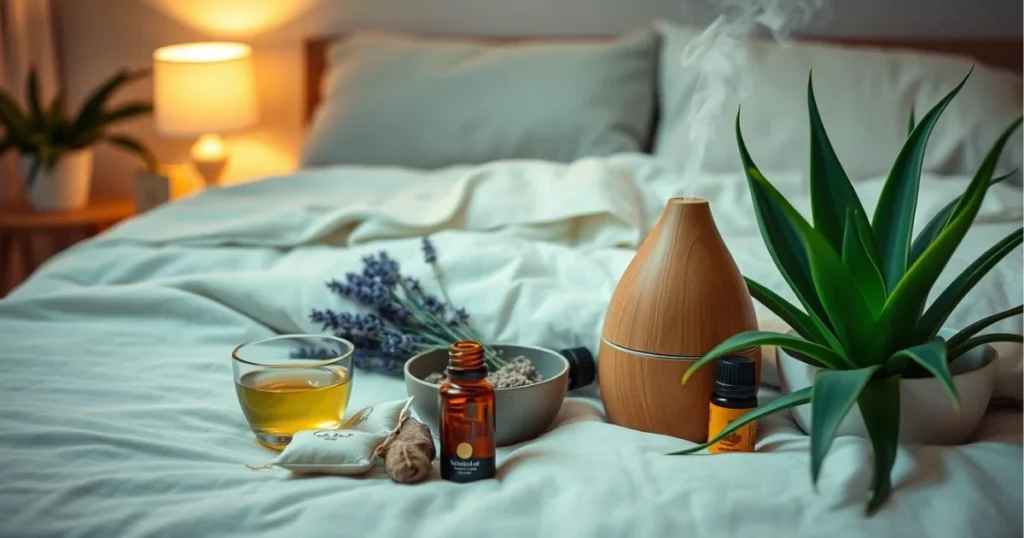How to Get More Deep Sleep for Better Rest
Getting a good night’s sleep is key for your health and happiness. You know sleep is vital for your body and mind to heal. To sleep better, it’s important to know how to get more deep sleep. Deep sleep helps your body fix tissues, build bones and muscles, and boost your immune system.
In this article, we’ll share the best ways to improve your sleep. We’ll give you practical tips on how to get more deep sleep.
Learning to get more deep sleep means waking up feeling new and ready for the day. Better sleep can make a big difference in your life. It can increase your energy and clear your mind. We’ll explore how to create the perfect sleep space, find the best sleep time, and how diet and exercise affect your sleep.
Table of Contents
Understanding Deep Sleep and Why It Matters
Deep sleep is key to your health and happiness. It’s when your body gets to rest and repair itself. This makes you feel ready to tackle the day with energy.
The Science Behind Deep Sleep
In deep sleep, your body fixes tissues, builds bones and muscles, and boosts your immune system. It’s vital for your body’s recovery and health.
Benefits of Quality Deep Sleep
- Improves memory and learning abilities
- Regulates mood and reduces stress
- Enhances immune function
- Promotes healthy growth and development
Sleep Cycle Stages Explained
Your sleep goes through different stages, including light sleep, deep sleep, and REM sleep. Getting more deep sleep in these cycles can make you sleep better and feel more rested.
Creating the Perfect Sleep Environment
Your bedroom is key to getting good sleep. Making it sleep-friendly can really help.
Here are some tips to make your bedroom a cozy retreat:
- Room Temperature: Keep it cool, between 60-67°F, for better sleep.
- Lighting: Use blackout curtains and avoid bright lights before bed.
- Noise Levels: Use earplugs or a white noise machine to block out noise.
- Bedding Choices: Choose a comfy mattress and breathable bedding for comfort.
| Factor | Best Sleeping Tips |
|---|---|
| Room Temperature | Maintain a cool environment (60-67°F) to promote deeper sleep. |
| Lighting | Use blackout curtains and dim lights to create a dark atmosphere. |
| Noise Levels | Employ earplugs or white noise machines to minimize disruptions. |
| Bedding Choices | Select a supportive mattress and breathable sheets for maximum comfort. |
Follow these tips to make your bedroom sleep-friendly. You’ll sleep better every night.
The Best Time to Sleep for Optimal Deep Sleep
Finding the right bedtime can greatly improve your sleep. Going to bed when your body naturally wants to can help you enhance sleep patterns. This leads to more restful nights.
Understanding Your Circadian Rhythm
Your circadian rhythm is like an internal clock that controls when you sleep and wake. By listening to these natural signals, you can start healthy sleep habits. These habits help you sleep deeper.
Optimal Sleep Schedule Tips
To set up the best sleep schedule, follow these tips:
- Establish a regular bedtime and wake-up time for each day.
- Create a calming bedtime routine.
- Limit exposure to screens before sleep.
Managing Sleep Debt
Sleep debt occurs when you don’t get enough rest. To tackle it, focus on consistent sleep. Do not stay up late to try to get caught up. Building healthy sleep habits reduces sleep debt. It also improves your sleep quality.
How to Get More Deep Sleep Through Diet
Your diet is key to good sleep habits. Making healthy dietary choices can help you get deeper and better sleep.
Try these natural sleep remedies in your meals:
- Almonds: Full of magnesium, almonds relax your muscles and help you sleep better.
- Turkey: It has tryptophan, which helps make melatonin.
- Chamomile Tea: This tea calms your mind and gets your body ready for sleep.
Stay away from these foods before bed to avoid sleep problems:
- Caffeine: In coffee and some teas, caffeine keeps you awake.
- Spicy Foods: They can cause indigestion and make it hard to sleep.
- Heavy Meals: Big meals can make you restless and lower sleep quality.
Also, when you eat affects your sleep. Aim for two to three hours before bedtime for your last meal. This lets your body digest and rest.
| Foods to Eat | Foods to Avoid |
|---|---|
| Almonds | Coffee |
| Turkey | Spicy Foods |
| Chamomile Tea | Heavy Meals |
Exercise and Movement Patterns for Better Sleep
Regular physical activity can greatly improve your sleep quality. The right exercises help your body relax, making it easier to fall and stay asleep. This supports healthy sleep habits.
Best Types of Exercise for Sleep
- Aerobic activities like walking, jogging, or swimming
- Strength training exercises
- Yoga and stretching routines
- Tai Chi for relaxation
Timing Your Workouts
Timing your workouts is key to better sleep. Finish vigorous exercise at least three hours before bed. This lets your body cool down and your heart rate return to normal.
Post-Exercise Recovery and Sleep
Having a post-workout recovery routine can improve your sleep. Gentle stretching, meditation, or a warm bath can help relax you. This promotes deeper, more restful sleep.
Natural Remedies and Supplements for Deep Sleep
Improving your sleep quality can be done with natural remedies. These options help you relax and sleep deeper without needing medicines.

- Chamomile Tea: Known for its calming effects, chamomile can help you unwind before bedtime.
- Valerian Root: This herb may improve sleep quality and reduce the time it takes to fall asleep.
- Lavender Essential Oil: Using lavender oil in a diffuser can create a soothing environment conducive to deep sleep.
- Melatonin Supplements: Melatonin can regulate your sleep-wake cycle, making it easier to achieve restful sleep.
It is important to talk to a doctor or nurse before taking any new supplement. They can ensure it’s safe and right for you.
| Remedy | Benefits | Recommended Dosage |
|---|---|---|
| Chamomile Tea | Promotes relaxation and reduces insomnia | 1-2 cups before bedtime |
| Valerian Root | Improves sleep quality and reduces sleep latency | 300-600 mg taken 30 minutes before bed |
| Lavender Essential Oil | Creates a calming environment | 5-10 drops in a diffuser |
| Melatonin | Regulates sleep-wake cycles | 1-3 mg taken 30 minutes before sleep |
Adding these natural sleep remedies to your routine can be a gentle and effective way. It can help you get more deep sleep and improve your overall well-being.
7_section>
Technology and Sleep: Finding the Right Balance
Technology is a big part of our lives, but it can affect our sleep. It’s important to find a balance. This ensures technology helps us sleep, not hurts it.
Digital Devices and Sleep Quality
Too much screen time before bed can make it hard to sleep. Blue light is emitted by computers, tablets, and smartphones. This light stops our bodies from making melatonin, the sleep hormone.
Sleep-Tracking Apps and Devices
But, sleep-tracking apps and devices have a positive side. They help us understand how we sleep. By tracking our sleep, we can make our sleep space better and sleep better too.
Blue Light Management
Managing blue light is key to better sleep. Use blue light filters on your devices or wear glasses that block it in the evening. This helps reduce its effect on sleep.
Here are some tips to manage technology for better sleep:
- Set a digital curfew: Turn off screens at least one hour before bedtime.
- Use night mode settings on devices to minimize blue light.
- Create a tech-free zone in your bedroom to optimize sleep environment.
| Technology Aspect | Impact on Sleep | Best Sleeping Tips |
|---|---|---|
| Screen Time | Disrupts sleep quality | Limit device use 1 hour before bed |
| Blue Light Exposure | Affects melatonin production | Use blue light filters or glasses |
| Sleep-Tracking Devices | Helps monitor sleep patterns | Use data to adjust sleep habits |
Stress Management Techniques for Better Sleep
Stress can make it tough to improve sleep quality. When your mind is racing, it’s hard to relax. But, there are natural sleep remedies to calm your stress before bed.
Here are some effective techniques to help you unwind:
- Meditation: A few minutes each day can reduce stress and prepare your mind for rest.
- Deep Breathing Exercises: Simple breathing techniques can slow your heart rate and ease tension.
- Journaling: Writing down your thoughts before bed can help clear your mind and reduce anxiety.
- Progressive Muscle Relaxation: Tensing and then relaxing each muscle group can release physical stress.
Adding these strategies to your daily routine can improve your sleep. By managing stress, you prepare for a restful night and better health.
Pre-Sleep Routines That Enhance Deep Sleep
Creating a consistent pre-sleep routine is key to better sleep. These routines tell your body it’s time to relax and get ready for sleep.

Evening Ritual Recommendations
- Create a calming environment by dimming the lights and reducing noise.
- Engage in a relaxing activity like reading a book or taking a warm bath.
- Set a regular time to go to bed to keep your body’s clock in sync.
Relaxation Techniques
- Practice deep breathing exercises to calm your mind.
- If you want to relax your body, try gradual muscle relaxation.
- To help you relax, listen to calming music or the sounds of nature.
Mindfulness Practices
- Incorporate meditation into your nightly routine to clear your mind.
- Use guided imagery to visualize peaceful and restful scenes.
- Focus on being present in the moment to reduce stress and anxiety.
Common Deep Sleep Disruptors to Avoid
To improve sleep quality, it’s key to know and get rid of things that mess with deep sleep. Here are some usual disruptors and how to handle them:
- Caffeine Consumption: Drinking caffeine in the afternoon or evening can keep you up. Try to cut down on coffee, tea, and other caffeinated drinks after 2 PM.
- Alcohol Use: Alcohol might make you sleepy at first, but it messes with your sleep cycle and cuts down on deep sleep. Stay away from drinking alcohol close to bedtime.
- Irregular Sleep Schedules: If you go to bed and wake up at different times each day, it confuses your body’s clock. Try to stick to a regular sleep schedule, even on weekends.
- Environmental Disturbances: Noises, light, and changes in temperature can mess with your sleep. Make your bedroom dark, quiet, and cool to help you sleep better.
By tackling these disruptors, you can make your sleep environment better for deep, restful sleep. Making these changes can really improve sleep quality and boost your health.
Medical Conditions That Affect Deep Sleep
It’s important to know how some health issues can affect your sleep. If you’re having trouble sleeping deeply, finding out what’s causing it can help a lot.
Many sleep disorders can make it hard to sleep deeply. Some common ones include:
Sleep Disorders Overview
- Sleep Apnea: This makes you stop breathing while you sleep, waking you up a lot.
- Insomnia: It’s hard to fall or stay asleep, which lowers your sleep quality.
- Restless Legs Syndrome: This makes your legs feel uncomfortable and you want to move them, which can keep you awake.
When to Consult a Sleep Specialist
If you snore loudly, feel very tired during the day, or have trouble sleeping for a long time, you should see a sleep doctor. They can figure out what’s wrong and help you sleep better.
Treatment Options
What treatment you get depends on your condition. Here are some options:
- Continuous Positive Airway Pressure (CPAP): This helps with sleep apnea.
- Cognitive Behavioral Therapy (CBT): It’s good for insomnia.
- Medications: These can help with restless legs syndrome symptoms.
Getting help from a doctor can really improve your deep sleep. This means you’ll wake up feeling better and more energetic.
Conclusion: Your Path to Restorative Deep Sleep
Starting your journey to better sleep is a big step towards feeling better. You’ve learned many ways to improve your sleep and habits. Making your sleep space right, keeping a regular sleep schedule, and handling stress are key to deep sleep.
Improving your sleep takes time and effort. Begin with one or two tips that appeal to you. Then, add more to your routine slowly. Healthy sleep habits will not only make you sleep better but also improve your health and daily life.
Keep working towards your sleep goals. Soon, you’ll wake up feeling refreshed and full of energy. Here’s to your success in getting better, deeper sleep!

